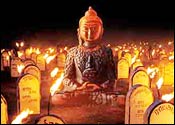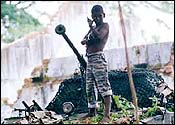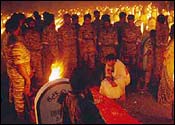Home > Movies > Interviews
'Those who banned the film have not seen it!'
Shobha Warrier |
April 25, 2003 10:55 IST
Rajesh Nair Touchriver got to write and direct his first feature film, In The Name Of Buddha, quite by accident.
This British film (in English, Tamil, Sinhalese and Hindi) has been creating waves for the wrong reasons. Though it has won many international awards, it came under the spotlight because it was banned in Sri Lanka.
In The Name Of Buddha recently won the Best Feature Film Award at the Newport Beach International Film Festival, California.
The film will be released in London in the second week of May.
Touchriver was a teacher at the National School of Drama, New Delhi, before he moved to Hyderabad. He has worked as art director in Hindi, Telugu and Tamil films. He is also a visiting professor with many international universities.
Touchriver tells Shobha Warrier how he made In The Name Of Buddha, a film about a Tamil Sri Lankan. He says he still cannot understand why the Sri Lankan government banned the film.
How did you get to direct a British film?
I used to go to London regularly as a visiting professor. There, at a cultural programme, I met Sai George, a British Malayalee. He is the son of yesteryear producer-director K S Antony, who introduced singer K J Yesudas to films.
Sai, who has a lot of Sri Lankan friends, said he had a story in mind. He asked whether we could make a film with the Sri Lankan civil war as the backdrop. I said it would be very relevant.
He narrated the story of a young Sri Lankan who had to abandon his country while he was in the final year of his MBBS studies in Colombo. He came as a refugee to England, sought asylum, and finally became a British citizen.
Sai asked me to write a screenplay based on the life of this young man.
Did the offer come as a surprise to you?
This was not my first screenplay. The others still remain screenplays and have not been made into films. But I have also written and directed many plays. As guest faculty to many universities all over the world, I teach students many things, including screenplay writing.
Once I finished writing the screenplay, Sai introduced me to someone he called the real hero of my story. So I met the character only after I finished the screenplay.
Who is he?
He does not want me to reveal his identity. When we held a screening of the film in London, he came with his family. After the film, he had tears in his eyes. He later told me he could not sleep for a month -- all his memories of those dark days came back to him.
Why did you choose the title In The Name Of Buddha? 
Buddha taught ahimsa [non-violence]. But the land of the man who taught ahimsa has become the land of graveyards. I feel Buddha has become a silent spectator to what is happening in the land of his followers.
When did the mantle of director fall on you?
When I asked Sai who would direct the film, he asked me whether I could. I said yes.
Then I worked on the screenplay again. I watched a lot of BBC documentaries, visited a lot of sites on the Internet. Then I rewrote the screenplay to last two-and-a-half hours as opposed to the original 95 minutes. It took me seven months to finish it.
Did you go to Sri Lanka to shoot the film?
No. I found -- on those BBC programmes -- that many parts of Kerala and some parts of Tamil Nadu resembled Sri Lanka. So I chose Kerala and Tamil Nadu to shoot the film.
I heard you chose people from Kerala to act in the film. Was it because you found a lot of similarity between Keralities and Sri Lankans?
If you take the history of Kerala, you will find the word Eelam in it. Those who came from Eelam are called Ezhavar [a community in Kerala]. I feel Sri Lankan Tamilians are more similar to Keralites. Their food habits are similar to the Sri Lankans. Their features also match.
That was why I selected Keralites to portray my characters. I just chose ordinary people who have no experience in acting.
The main character is a Malayalee called Shiju, who acts in Telugu films.
How long did it take to finish shooting the film?
It took only 52 days. It is a multilingual film; it has English, Ilangai Tamil, Sinhalese and Hindi.
Your film has won many international awards. Did you expect this kind of a response?
While making a movie, the only thought you have in mind is to complete it. I only wanted to make a good film. Once it was over, I wanted to send it to the festival circuits.
Why do you think the Sri Lankan government banned your film? Is your film biased towards Sri Lankan Tamils?
That was unexpected. It came as a big shock to me.
The funniest thing is, those who have banned the film have not seen it. Not one Sri Lankan was present at the world premiere in Norway. The media who wrote against my so-called bias was also not there.
The storm started a fter the Norway screening. How can anyone give a value judgement without watching the film?
fter the Norway screening. How can anyone give a value judgement without watching the film?
When my film was selected for BAFTA, the Sri Lankan government requested the British government not to screen it. So, In The Land Of Buddha was thrown out of the list of selected films.
The British film classification board saw the film and certified it has nothing to do with Buddha. Now, the film will be released in London in May, and later in France and Norway.
The ban has had an adverse effect on the film. Many festivals do not want to have anything to do with a banned or controversial film.
Why did you change your name from Rajesh Thodupuzha to Rajesh Touchriver?
It was because of the distributors that I changed my name. If I were a known director in India, the problem would not have arisen. This is my first film and it is a British production. Distributors are not very interested in a British film directed by an unknown Asian. So, they asked me to change my surname to something that is easier to pronounce! Finally, it was the producer who came with Touchriver, the English translation of Thodupuzha (a place in Kerala)!